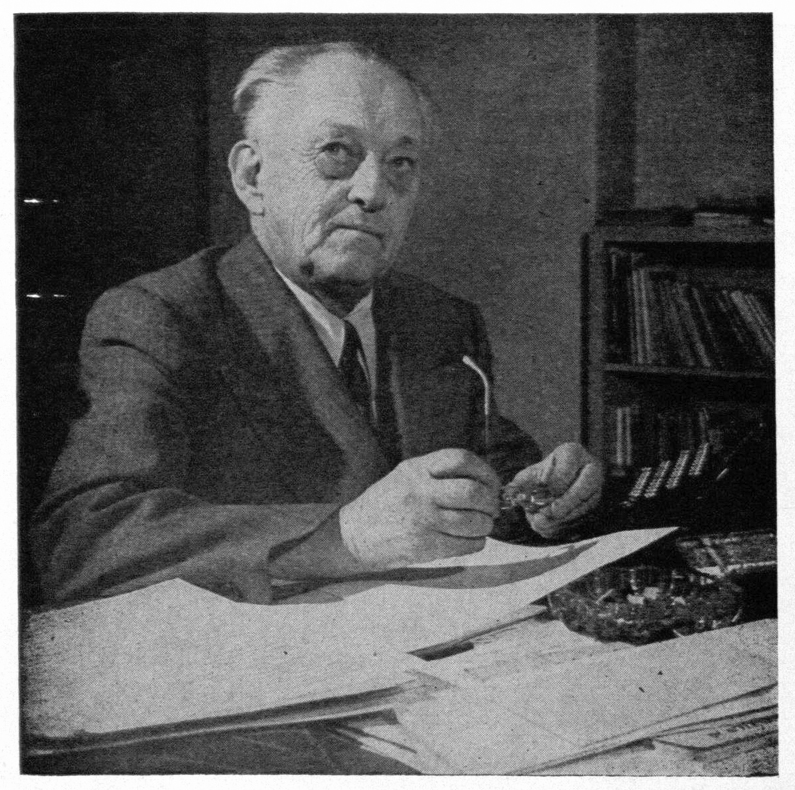
Editor of this issue: L. Sabaliūnas
 |
www.lituanus.org |
|
Copyright
© 1956 Lithuanian
Students Association, Inc.
No..1(6)
- February 1956
Editor of this issue: L. Sabaliūnas |
|
WRITERS OF LITHUANIA
Vincas Krėvė
(1882-1954)
 |
VINCAS KRĖVĖ (full name: Vincas Krėvė-Mickevičius), poet, dramatist, short-story writer, and scholar, probably the most outstanding creative personality in the history of the Lithuanian literature. After receiving his degrees at the universities of Lvov (1908) and Kiev (1912), he taught Russian language and literature in Baku. From 1918 to 1920, he was Lithuanian consul in Azerbaijan. In 1920 V. Krėvė returned to Lithuania and became Professor of Slavic Literatures at the University of Lithuania, 1922-39 in Kaunas, and 1940-44 in Vilnius. He was Dean of the Faculty of Humanities 1926-39 and the first President of the Lithuanian Academy of Arts and Sciences. His activities resulted in the birth of numerous cultural and literary magazines. Among the most outstanding publications under the editorship of V. Krėvė were the works of the Faculty of Humanities of the University of Kaunas: Tauta ir žodis (Nation and Word, Lietuvos universiteto Humanitarinių mokslų fakulteto raštai (Writings of the Faculty of Humanities of the University of Kaunas), Darbai ir dienos (Deeds and Days), and Mūsų tautosaka (Our Folklore). He also edited and published much material of Lithuanian folklore. For his extensive research in the field of folklore he received in 1938 an honorary degree from the University of Latvia.
In 1940 V. Krėvė became Prime Minister and Minister of Foreign Affairs of Lithuania. His protests against Soviet policy led later to his removal. In the course of the second occupation of Lithuania by the Soviets he left in 1944 his native country and stayed several years in Austria in a camp for Displaced Persons. In 1947 V. Krėvė immigrated to the United States, where he was invited to join the Faculty of the University of Pennsylvania. He was Assistant Professor of Slavic and Lithuanian literatures until his retirement in 1953.
As the leading Lithuanian author V.
Krėvė became known for his masterpiece of rhytmic prose, Dainavos šalies senų
žmonių padavimai (The Old Folk Legends of Dainava; 1922),
based on the language and spirit of the folk tales and songs. In his
two-volume collection of short stories. Šiaudinėj pastogėj
(Under the Straw Roof; 1922-23), and in the play, Žentas (The
Son-in-Law; 1922), the author created a series of realistic episodes of
village life and has expertly combined psychological problems with
metaphysical ideas. With the historical dramas, Šarūnas
(1911) and Skirgaila
(1925), both full of psychological, national and religious conflicts
and deep tragedy, V. Krėvė has provided tho Lithuania literature the
unsurpassed masterpieces of that genre. He has also written stories on
Oriental themes, i.e., Rytų
pasakos (Tales of the Orient; 1930), in which he hat
deftly captured the manner and spirit of the Oriental world. For more
than 30 last years of his life V. Krėvė has been working on a
monumental biblical story. Dangaus
ir žemės sūnūs (The Sons of Heaven and Earth), the forst
volume of which has been published in 1949. In this work, although left
unfinished in its second volume, V. Krėvė's creative genius arises to
an international greatness.